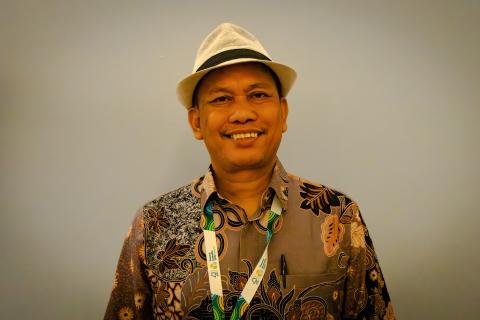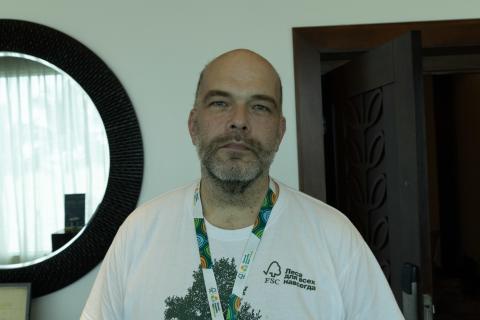Former FSC Integrity Director: 20-30% of claims are false - and FSC is looking away
The FSC label promises responsibly sourced products. But former FSC Integrity Director Phil Guillery says that trust has been eroded from within. In an interview with Preferred by Nature, Guillery reveals that as many as one in three FSC claims could be false — and that the system’s slow reform risks undermining decades of work on forest credibility.
When the Forest Stewardship Council (FSC) was launched in the early 1990s, it promised a simple but powerful idea: a label reassuring consumers their wood and paper products came from responsibly managed forests.
Thirty years on, the FSC logo is among the world’s most recognisable environmental marks. Yet Phil Guillery, who served as the organisation’s Director of System Integrity until 2021, says that promise has often been undermined by systemic weaknesses.
“For FSC, the heart of the system is trust in the label,” Guillery says. “When a product is labeled ‘FSC 100%’ or ‘FSC Controlled Wood,’ people assume that’s exactly what they are buying. Technically, FSC is not a full traceability system, but in principle you should be able to trace any claim back to the source and find that it holds true. When the label reflects reality, the system works. But if it doesn’t, the entire brand is undermined.”
A system open to abuse
Phil Guillery says that when he first examined supply chains in detail, he was shocked by the extent of false claims. It wasn’t just the occasional bad actor; it was systemic.
“Companies passed non-FSC wood through with an FSC claim, knowing auditors were unlikely to catch it. The rules made it easy to cheat and very difficult to detect fraud. That was the credibility gap we were up against.”
One of the biggest flaws, he says, was the lack of a volume control system. “Without it, companies could claim to buy a certain amount of FSC-certified wood, then keep passing off non-certified wood as if it were FSC. Auditors would only check if the supplier was certified, not whether the volumes matched,” said Phil Guillery.
“I estimated that 20–30% of claims in the system were false. That was years ago, and I haven’t seen anything to suggest the figure has dropped since.”
Phil Guillery
Former Director of System Integrity at FSC
False snowboards and lost credibility
“For several years, nearly every snowboard in Europe and the U.S. was sold with an FSC label. But when we investigated, we found that almost all of those claims were false. Entire production runs were marketed as FSC even though the material wasn’t.”
Guillery argues that the lack of openness compounds the damage. “FSC has never really owned up to the scale of the problem. Without open acknowledgment of these issues, members and the public are left believing the system is more solid than it actually is,” he says.
Patchy reforms, persistent resistance
To address the issue, Guillery and his team developed the Online Claims Platform (OCP), which enables the electronic matching of transactions and the reconciliation of volumes. Unfortunately, pushback on data privacy and resistance to change meant it was never adopted.
Since Guillery left the organisation in 2021, FSC has replaced the OCP with FSC Trace - a blockchain based system. However, FSC Trace is still only in beta-testing, and it will not provide full volume control.
“FSC is using transaction verification, but with 60,000 certificate holders, checking a handful of supply chains each year is like putting a band-aid on a broken system,” says Phil Guillery.
“This is not rocket science. The technology is there.”
“20–30% of claims were false”
So what is the state of integrity today? Sanctions against Russia have cut off a large share of the global FSC supply, but investigations by Preferred by Nature and other organisations show that Russian wood is still finding its way into global supply chains. Meanwhile, FSC is growing rapidly in China, and - it is likely - hand in hand with a rise in false claims.
“Back then, I estimated that 20–30% of claims in the system were false,” Guillery says. “That was years ago, and I haven’t seen anything to suggest the figure has dropped since. What has changed is that science-based testing—like DNA and isotopic analysis—has become much cheaper, faster, and more accurate. And every time it’s used, it tends to reveal more fraud than expected.”
Pointing to standards such as RSPO and Textile Exchange, successfully using volume control, Phil Guillery says FSC must act now, implement full volume control immediately and make it mandatory.
“Some of the largest global brands, from sportswear to retailers, use volume-tracking systems with smallholders and factories across the globe. So why is FSC still moving at a snail’s pace? This is not a question of technology—it’s a question of will,” he says.
“Instead of fearing transparency, FSC should embrace it”
Phil Guillery’s three recommendations for FSC
1. Implement volume control now
Begin with high-risk supply chains and make it mandatory, then expand system-wide.
2. Rethink Chain of Custody
Use DNA and isotopic testing, alongside electronic volume tracking, to simplify and strengthen the system.
3. Be transparent with members
Acknowledge the scale of false claims openly. Transparency may be uncomfortable, but it is the only way to rebuild trust.
About Phil Guillery

Phil Guillery is a forestry and supply chain integrity expert with over 25 years’ experience in sustainable forest management. He is co-founder and former executive director of World Forest ID, and currently works as a consultant to the US Forest Service Office of International Programs and as an advisor to the Orchard House Foundation. He is currently a board member of FSC US.
From 2011 to 2021, Guillery was Director of System Integrity at the Forest Stewardship Council (FSC), where he led global efforts to combat fraud and strengthen traceability. He has also held senior roles at The Forest Trust, Dovetail Partners, and the Institute for Agriculture and Trade Policy. Based in Boulder, Colorado, he continues to work at the intersection of technology, policy and forest conservation.
Last call to save the FSC?
For three decades, the Forest Stewardship Council has led the charge in responsible forest management, becoming the most successful certification system to date. But as FSC prepares for its 10th General Assembly, it's facing pivotal challenges. Issues of integrity, traceability, and trust threaten its survival. In this series leading up to the GA, we turn to key figures who have influenced and will be shaping the FSC's journey and ask: How can we secure its future?
Join Preferred by Nature at the FSC General Assembly 2025.




